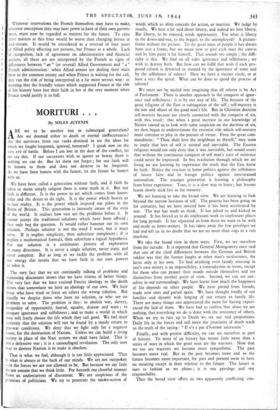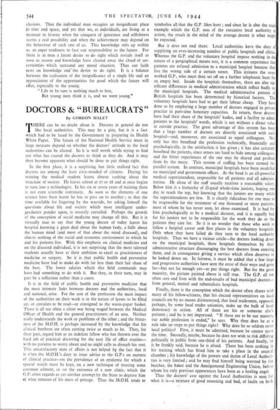MORITURI . . .
By MILES JUVENIS
ARE we to be another lost or submerged generation? Are we doomed either to death or eternal ineffectiveness? Arc the survivors from our ranks destined to see the ideas for which we fought forgotten, ignored, betrayed? I speak now on the very eve of battle. Before I am lost in the dust of the conflict, let me say this. If our successors wish to ignore or betray there is nothing we can do. But let them not forget ; for our faith will be known to them and does not deserve to be forgotten. As we have been honest with the future, let the future be honest with us.
We have been called a generation without faith, and if faith be taken to mean simply religion there is some truth in it. But our faith is different. It is the power to act which comes from know- ledge and the desire to do right. It is the power which braves us to face reality. It is the power which inspired our pilots in the Battle of Britain. This generation is intensely aware of the evils of the workl. It realises how vast are the problems before it. It cannot accept the traditional solutions which have been offered ; they only beg the question. It would rather hammer out its own solution. Perhaps solution is not the word I want, but it must serve. If it implies simplicity, then substitute complexity ; if it implies a mathematical formula, then substitute a logical hypothesis. For our solution is a continuous process of exploration in many directions. It is never a single solution, never static and never complete. But as long as we tackle the problem with all our energy this means that we have faith in our own powers to solve it.
The very fact that we are continually talking of problems and expressing discontent shows that we have visions of better things. The very fact that we have resisted Fascist ideology to the death shows that somewhere we have an ideology of our own. We hate those who have tried to force on others the wrong solution. But equally we despise those who have no solution, or who see no problem to solve. The problem is this: to abolish war, slavery, inequality of opportunity, hatred, squalor, disease and want ; to conquer ignorance and selfishness ; and to make a world in which men will freely choose the life which they call good. We feel most sio!ently that the solution will not be found by a steady return to pre-war conditions. We deny that we fight only for a negative cause, for the destruction of Nazism. Unless we can build a living society in place of the Nazi system we shall have failed. This is not a defensive war ; it is a camouflaged revolution. The only sure `A ay to destroy Nazism is to make it obsolete. • That is what we feel, although it is too little appreciated. That Is what is always at the back of our minds. We are not outspoken —in the forces we are not allowed to be. But because we say little el,) not assume that we think little. For beneath our cheerful manner flaws an undercurrent of discontent. We are suspicious of the Promises of politicians. We try to penetrate the smoke-screen of
words which so often conceals the action, or inaction. We judge by results. We hear a lot said about liberty, and indeed we love liberty. But liberty, to be enjoyed, needs opportunity. For what is liberty to the down-and-out, to the beggar, to the unemployed? A picture- frame without the picture. To the great mass of people it has always been just a frame, but we mean now to give each man the canvas and let him paint it for himself. That sounds too simple ; the diffi- culty is this. We find on all sides ignorance and selfishness ; we wish to destroy both. But how can we fulfil that wish if each pro- posed reform is thwarted or stunted by the ignorance of some and by the selfishness of others? Here we have a vicious circle, or at least a very flat spiral. What can be done to speed the process of reform?
We must not be misled into imagining that all reform is by Act of Parliament. There is another approach to the conquest of ignor- ance and selfishness: it is by our way of life. The keynote of the great religions of the East is subjugation of the self ; self-mastery is the aim and object of the good man's life. But in Christian doctrine self-mastery became too closely connected with the conquest of sin, with this result: that when a great increase in our knowledge of Nature caused us to look with some suspicion on the doctrine of sin, we then began to underestimate the essential role which self-mastery must continue to play in the pursuit of virtue. Even the great com- mandment: " Thou shalt love thy neighbour as thyself," may seem to imply that love of self is natural and inevitable. The Eastern religions would not only deny that it was inevitable, but would assert that without the continuous conquest of self man's state of existence could never be improved. In this rcvolution through which we arc living we are learning by experience the truth that the East knew by faith. Notice the reaction in home politics against the selfishness of laisser faire and in foreign politics against unrestrained nationalism. The younger generation is learning a philosophy from bitter experience. True, it is a slow way to learn ; but lessons learnt slowly stick fast in the memory.
We are learning to take the broad view. We are learning to look beyond the narrow horizons of self. The process has been going on for centuries, but we have noticed how it has been accelerated by war. The war has made us think. It has jolted us and kicked us around. It has forced us to do unpleasant work in unpleasant places for long periods. It has separated us from those we want to he with and made us letter-writers. It has taken away the few privileges we had and left us in no doubt that we are no more than cogs in a vast machine.
We take the broad view in three ways. First, we see ourselves from the outside. It is reported that General Montgomery once said that one of the chief differences between the German and British soldier was that the former laughs at other men's misfortunes, the latter only at his own. To find anything even faintly amusing in one's own misery is an impossibility, a contradiction in terms, except for those who can project their minds outside themselves and see themselves from another point of view. Second, we can see our- selves in our surroundings. We have learnt how much the happiness of life depends on other people. We have parted from friends, made new ones and parted again. We have thought fondly of our families and dreamt with longing of our return to family life. There are many things one appreciated the more for having experi- enced the lack of them. We have had to confess that alone we are nothing, that everything we do is done with the assistance of others. When we try to faCe up to Death we see our real proportions. Daily life in the forces and still more the proximity of death teach us the truth of the saying: " II n'y a pas d'homme necessaire " Finally, and with greater difficulty, we can see ourselves as part of history. To most of us history has meant little more than a series of wars in which the great men are the warriors. Now that we too are warriors we become more sympathetic. The past becomes more real. But as the past becomes more real so the future becomes more important, for past and present seem to have no meaning except in their relation to the future. The future is ours to fashion as we please ; it is our privilege and our responsibility.
Thus the broad view offers us two apparently conflicting con-
elusions. That the individual man occupies an insignificant place in time and space, and yet that we, as individuals, are living at a moment in history when the conquest of ignorance and selfishness seems a real possibility and when the achievement may depend on the behaviour of each one of us. This knowledge stirs up within us an eager readiness to face our responsibility to the future. For there is in man a latent desire to do right which reveals itself as soon as reason and knowledge have cleared away the cloud of un- certainties which surround any moral situation. Thus our faith rests on knowledge and' the desire to do right. It is a balance between the realisation of the insignificance of a single life and an appreciation of the opportunities for good which the future will offer, especially to the young.
" Life to be sure is nothing much to lose, But young men think it is, and we were young."



























 Previous page
Previous page